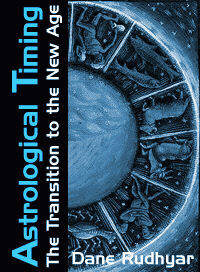 |
| Home | Bio | Art | Music | Literature | Civilization & Culture | Philosophy of Wholeness | Theosophy & Spirituality | Astrology |

ASTROLOGICAL TIMING
The Transition to the New Age by Dane Rudhyar, 1969 First published under the title Birth Patterns for a New Humanity
CONTENTS
PROLOGUE Where Do We Stand Today? PART ONE 1. Three Centuries of Crisis 2. Planetary Cycles 3. Cycles of Relationship PART TWO 4. Stars, Constellations and Signs of the Zodiac 5. From Buddha to Christ 6. The Structure of the Piscean Age Page 1 Page 2 Page 3 Page 4 Page 5 Page 6 Page 7 7. At the Gates of the New Age 8. The Aquarius-Leo Age PART THREE 9. The Zodiacal Earth-Field 10. As We Face the Future EPILOGUE |

CHAPTER SIX
The Structure of the Piscean Age - 5 X. 1522 to 1702 AD This "tenth House" period can be divided into two phases. In the first — 1523 to 1613 — we see the occult-mystical tradition of the Gothic Age coming to its fruition in great Alchemists, Fire-Philosophers and Rosicrucians. The Rosicrucian Brotherhood was presumably founded (at least in its European form) by Christian Rosenkreutz who lived around 14,00 AD — at the same time that Tzong-Kha-Pa was regenerating Buddhism in Tibet, and a mystic renascence was about to be initiated in India by men like Ramananda, Kabir, Nanak and Krishna Chaitanya under the Sufi influence. The transition from the "ninth House" to the "tenth House" phase of this movement can be seen in the spiritual relationship between men like the great Benedictine abbot of Wurtzburg, John Trithemius, 1450-1518 (who is associated with the story of Faust), Cornelius Agrippa (1486-1503) and, greatest of all, Paracelsus (1493-1541). A few decades later, in England, this first phase of the "tenth House period" has its striking manifestation in the Elizabethean Age (1558-1603) and its great men who, at the same time, accept a great deal of the spiritual-alchemical thought of the Rosicrucians and initiate the new spirit of scientific experimentalism (Francis Bacon's and his Novum Organum) and of individualistic modern psychology (Shakespeare's Hamlet, etc.)— while initially, men like Bruno and Galileo uphold the new vision of the world of which Copernicus has been the prophet. With the second phase of the period — 1613 to 1703 — we witness the crystallization of the new spirit in the late Renaissance and the Classical Era. And the most characteristic social phenomenon is the development under Richelieu of the French authoritarian State symbolized by Louis XIVth (le Roi Soleil) and the Court of Versailles with its formalistic culture. French rationalism is characterized by the philosophy of Descartes and by such literary figures as Corneille, Racine, Moliere, La Bruyere, etc. The triumph of French culture is established partly upon the foundation of Germany's defeat and near-annihilation in the Thirty Year War. The Peace of Westphalia (October 24, 1648) retards the development of Germany as a nation, and thus can be said to be the foundation of the struggle between France and Germany which will lead to the recent World Wars. England, in the mean time, having enriched herself by pirating the gold which Spain has been extracting from America and the tortured Indians, is slowly building her Empire. Spain is degenerating and Italy remains divided, Sweden rises to a momentary state of political hegemony; and the giant Russia, having repulsed the Mogols, awakens to Western civilization under the Romanovs (Peter, the Great; 1689-1725). By permission of Leyla Rudhyar Hill Copyright © 1969 by Dane Rudhyar and Copyright © 2001 by Leyla Rudhyar Hill All Rights Reserved.  Web design and all data, text and graphics appearing on this site are protected by US and International Copyright and are not to be reproduced, distributed, circulated, offered for sale, or given away, in any form, by any means, electronic or conventional. See Notices for full copyright statement and conditions of use. Web design copyright © 2000-2004 by Michael R. Meyer. All Rights Reserved. |
 |